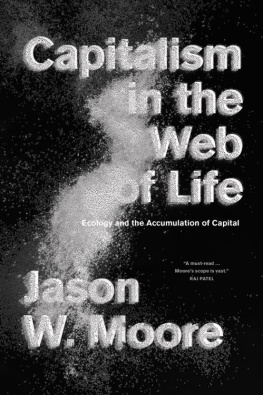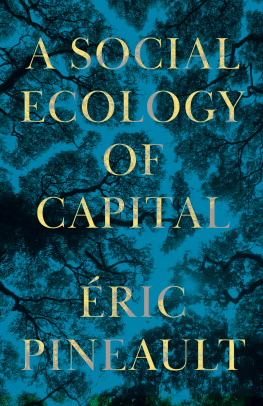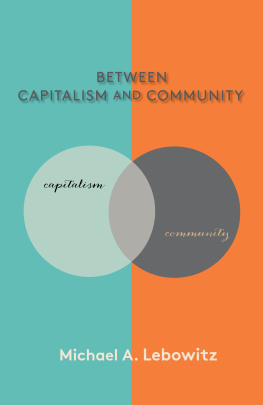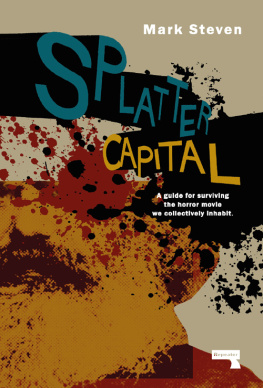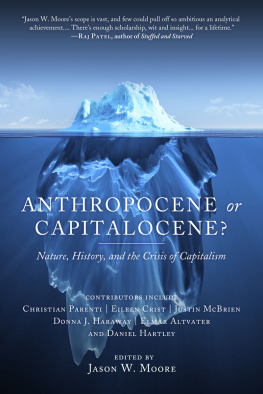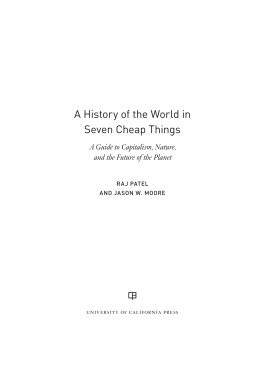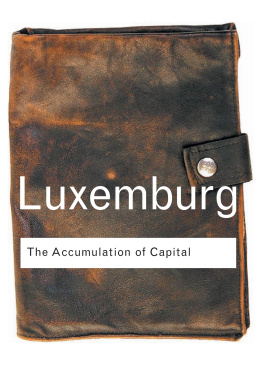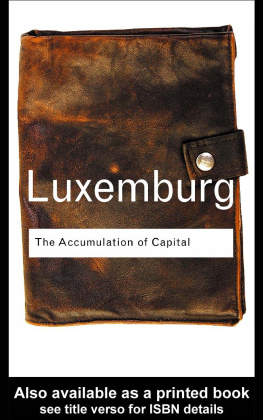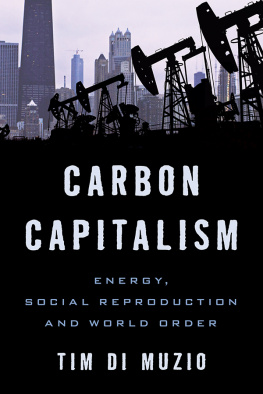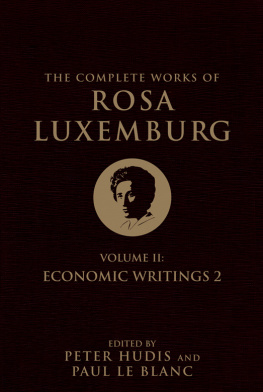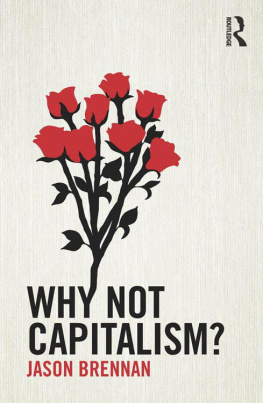Jason W. Moore - Capitalism in the Web of Life: Ecology and the Accumulation of Capital
Here you can read online Jason W. Moore - Capitalism in the Web of Life: Ecology and the Accumulation of Capital full text of the book (entire story) in english for free. Download pdf and epub, get meaning, cover and reviews about this ebook. year: 2015, publisher: Verso Books, genre: Romance novel. Description of the work, (preface) as well as reviews are available. Best literature library LitArk.com created for fans of good reading and offers a wide selection of genres:
Romance novel
Science fiction
Adventure
Detective
Science
History
Home and family
Prose
Art
Politics
Computer
Non-fiction
Religion
Business
Children
Humor
Choose a favorite category and find really read worthwhile books. Enjoy immersion in the world of imagination, feel the emotions of the characters or learn something new for yourself, make an fascinating discovery.
- Book:Capitalism in the Web of Life: Ecology and the Accumulation of Capital
- Author:
- Publisher:Verso Books
- Genre:
- Year:2015
- Rating:4 / 5
- Favourites:Add to favourites
- Your mark:
- 80
- 1
- 2
- 3
- 4
- 5
Capitalism in the Web of Life: Ecology and the Accumulation of Capital: summary, description and annotation
We offer to read an annotation, description, summary or preface (depends on what the author of the book "Capitalism in the Web of Life: Ecology and the Accumulation of Capital" wrote himself). If you haven't found the necessary information about the book — write in the comments, we will try to find it.
Jason W. Moore: author's other books
Who wrote Capitalism in the Web of Life: Ecology and the Accumulation of Capital? Find out the surname, the name of the author of the book and a list of all author's works by series.
Capitalism in the Web of Life: Ecology and the Accumulation of Capital — read online for free the complete book (whole text) full work
Below is the text of the book, divided by pages. System saving the place of the last page read, allows you to conveniently read the book "Capitalism in the Web of Life: Ecology and the Accumulation of Capital" online for free, without having to search again every time where you left off. Put a bookmark, and you can go to the page where you finished reading at any time.
Font size:
Interval:
Bookmark:
Jason W. Moore is an environmental historian and political economist in the Department of Sociology at Binghamton University and coordinator of the World-Ecology Research Network.
of Capital

First published by Verso 2015
Jason W. Moore
All rights reserved
The moral rights of the author have been asserted
1 3 5 7 9 10 8 6 4 2
Verso
UK: 6 Meard Street, London W1F 0EG
US: 20 Jay Street, Suite 1010, Brooklyn, NY 11201
www.versobooks.com
Verso is the imprint of New Left Books
ISBN-13: 978-1-78168-902-8 (PB)
ISBN-13: 978-1-78168-901-1 (HC)
eISBN-13: 978-1-78168-904-2 (US)
eISBN-13: 978-1-78168-903-5 (UK)
British Library Cataloguing in Publication Data
A catalogue record for this book is available from the British Library
Library of Congress Cataloging-in-Publication Data
Moore, Jason W.
Capitalism in the web of life : ecology and the accumulation of capital / Jason W. Moore. 1st Edition.
pages cm
ISBN 978-1-78168-902-8 (paperback) ISBN 978-1-78168-901-1 (hardcover) ISBN 978-1-78168-904-2 (ebook : US) ISBN 978-1-78168-904-2 (ebook : UK)
1. Economic developmentEnvironmental aspects. 2. Economic policyEnvironmental aspects. 3. Environmental policy. I. Title.
HD75.6.M66 2015
333.7dc23
2015013430
Typeset in Minion Pro by Hewer Text UK Ltd, Edinburgh, Scotland
Printed in the US by Maple Press
For Malcolm,
Who inspired this book.
And for his generation,
may they may find the inspiration they need to see
themselves and the world as One,
and to change it accordingly.
And for Diana,
Who made it all possible.
This book is an invitation. It is offered as an opening to conversation, and an incitement to serious debate, over humanitys place in nature, and how our thinking about this place in nature shapes our view of history, our analysis of the present crisis, and the politics of liberation for all life.
Capitalism in the Web of Life is, perhaps more than most, the product of an extended and sustained global conversation. There are many fingerprints on this book. Some are more obvious than others. Observations and reflections from a great many colleaguesmany encountered through gracious invitations to give talks at universities in North America, Europe, and Chinahave made their way into the book. Audiences forced me to think in new ways; even when we have not agreed, their questions and critiques sharpened this books clarity in unexpected, and deeply appreciated, ways. So too the extraordinary contributions of the intellectual fields on which I build: environmental and economic history, world history and world-systems analysis, political ecology and critical human geography, Marxist feminism, global political economy, agro-food and critical development studies, and many, many more. It is with great respect and admiration for a half-century of radical scholarship that I have sought to build out and synthesize the dialectical implications of these fields (and not just these) for the study of humanity-in-nature.
Capitalism in the Web of Life reflects two decades of reflection and study at the nexus of two great concerns: the history of capitalism and environmental history. It has been a long, productive, exciting, and often tumultuous, journey. This books ideas were formulated on both coasts of North America, on both sides of the Atlantic, at eight universities. Diana C. Gildea, my wife, best friend, and co-conspirator, has been with me for all of it. You would not be reading these wordsor any of those that followwithout Dianas affirmation that world-ecology, and this book in particular, was a project worth pursuing, and her insistence that the project be pursued with intellectual creativity and rigor.
This journey towards a unified theory of historical capitalism and historical nature first took shape out of conversations with John Bellamy Foster two decades ago. Although many of this books formulations are at odds with Johns arguments today, my debt to him as a teacher and colleague is incalculable. From Edumund (Terry) Burke III and Giovanni Arrighi, I learned the strange arts of world history. Terry saved me from taking theory as a substitute for history; Giovanni helped me to see that world history is indispensable to our analysis of the present crisis. Richard Walkerknown affectionately as DW to his friendsfinally convinced me that geography matters. (I mean: Geography. Really. Matters.) And, equally, that the endless accumulation could not simply be invoked; a theory of capital accumulation had to be central to thinking capitalisms world histories. More than that, DWs rare combination of rigorous scholarship, elemental kindness, and academic good sense has contributed mightily not only to the books intellectual clarity, but to the conditions under which the book was written. Henry Bernstein encouraged me to do the book with Verso, and his sustained critiqueand encouragementallowed me to sharpen my arguments well beyond what I thought possible.
Numerous colleagues read and commented upon various incarnations of my argument in this book. I am especially grateful to Sharae Deckard, Michael Niblett, Stephen Shapiro, and their wonderful colleagues in the Warwick diaspora of world literary studies. They have been a constant source of inspiration and encouragement. In addition to those already mentioned, thanks also to Benjamin D. Brewer, Holly Jean Buck, Jay Bolthouse, Alvin Camba, Christopher Cox, MacKenzie K.L. Moore, Phil McMichael, Mindi Schneider, and Christian Parenti, for comments on these arguments in draft.
I am deeply thankful for an extended family of scholars who have been a party to, though not always in agreement with, the world-ecology argument: Haroon Akram-Losdhi, Elmar Altvater, Farshad Araghi, Marco Armiero, rni Danel Jlusson, Stefania Barca, Jun Borras, Neil Brenner, Sandy Brown, Bram Bscher, Liam Campling, Jennifer Casolo, Eric Clark, Carol Crumley, Barbara Epstein, Samuel Day Fassbinder, Paul Gellert, Kyle Gibson, Pernille Gooch, Alf Hornborg, Erik Jnsson, Shiloh Krupar, Ashok Kumbamu, Rebecca Lave, Richard E. Lee, Larry Lohmann, Birgit Mahnkopf, Andreas Malm, Jessica C. Marx, Daniel Mnster, Carl Nordlund, Denis OHearn, Kerstin Oloff, Beverly J. Silver, Eric Vanhaute, Michael Watts, Tony Weis, Anna Zalik, and (especially!) Harriet Friedmann, Immanuel Wallerstein, and Dale Tomich. Xiurong Zhao and Gennaro Avallone, both brilliant scholars in their own right, deserve special thanks for book-length translations of my essays, forcing me along the way to clarify fuzzy arguments and murky formulations. (Now thats commitment!) My graduate students in the Department of Sociology at Binghamton University also deserve credit: Kushariyaningsih (Wiwit) Boediono, Alvin Camba, Joshua Eichen, Benjamin Marley, Cory Martin, Roberto J. Ortiz, Andy Pragacz, Shehryar Qazi, and Manuel Francisco Varo. Finally, my thanks to Binghamton University and the Department of Sociology, which under William G. Martins chairmanship offered exceptionally favorable conditions for completing this book. (Thanks, Bill!)
Very special thanks also to my editor, Sebastian Budgen, who put up with all sorts of delays, and who supported this project from the beginning.
Finally, my great thanks to Mike and Mary Anne Hofmann, for raising me in a home where ideas mattered; to Barbara Rose, for being the worlds coolest mother-in-law; to Marge Thomas, whose friendship and wisdom sustained this book to completion; and to my father, John W. Moore, who did not live to see this book but Im sure has been charting its progress all along, and would be very pleased indeed to see a little philosophy mixed in with hard-headed political economy.
Font size:
Interval:
Bookmark:
Similar books «Capitalism in the Web of Life: Ecology and the Accumulation of Capital»
Look at similar books to Capitalism in the Web of Life: Ecology and the Accumulation of Capital. We have selected literature similar in name and meaning in the hope of providing readers with more options to find new, interesting, not yet read works.
Discussion, reviews of the book Capitalism in the Web of Life: Ecology and the Accumulation of Capital and just readers' own opinions. Leave your comments, write what you think about the work, its meaning or the main characters. Specify what exactly you liked and what you didn't like, and why you think so.

